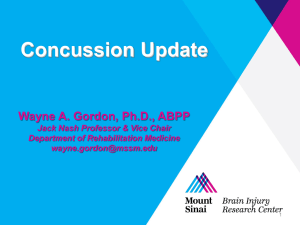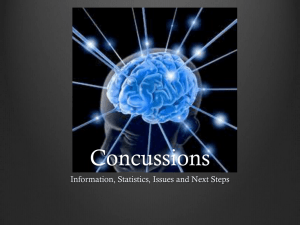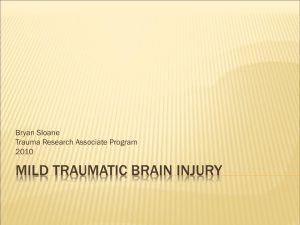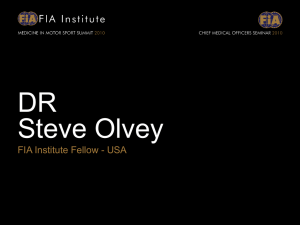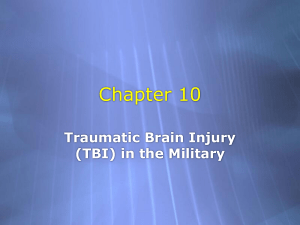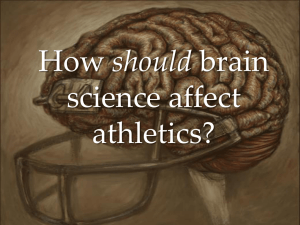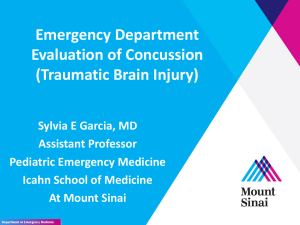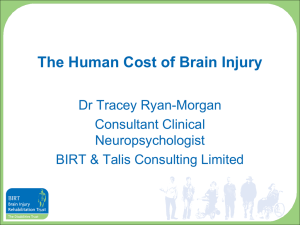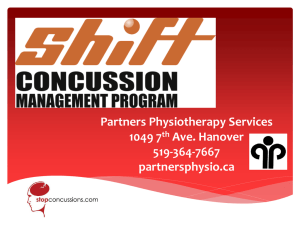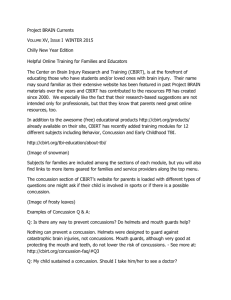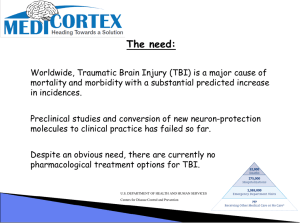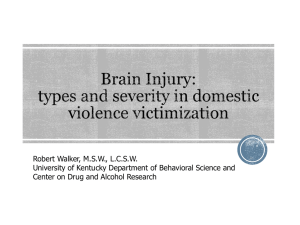Guest Lecture Powerpoint - McCausland Center | Brain Imaging
advertisement
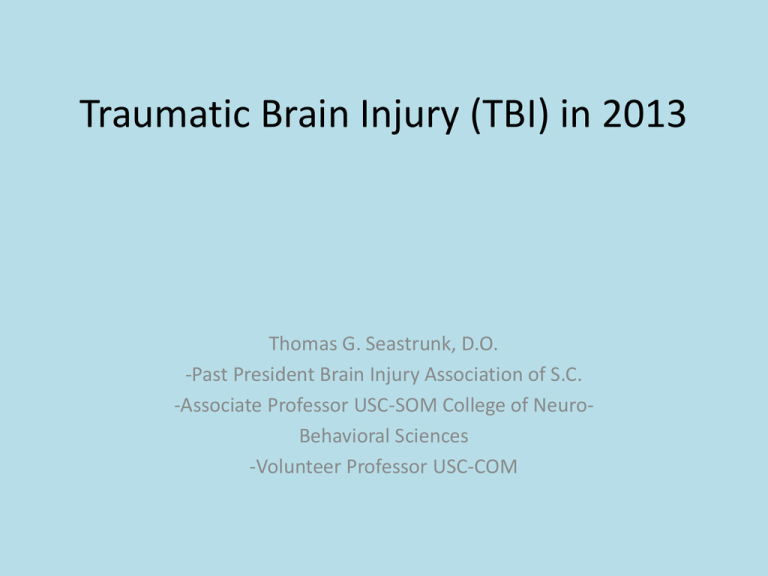
Traumatic Brain Injury (TBI) in 2013 Thomas G. Seastrunk, D.O. -Past President Brain Injury Association of S.C. -Associate Professor USC-SOM College of NeuroBehavioral Sciences -Volunteer Professor USC-COM Some General Facts: • “Traumatic brain injury means an acquired injury to the brain caused by an external physical force, resulting in total or partial functional disability or psychosocial impairment or both, that adversely affects a child’s educational performance.” General Facts: • The term applies to open or closed head injuries resulting in impairments in one or more areas, such as cognition; language; memory; attention; reasoning; abstract thinking; judgment; problem-solving; sensory, perceptual and motor abilities; psychosocial behavior; physical functions; information processing; and speech. General Facts: • Traumatic Brain Injuries • Open head injuries - penetrating wound to the brain • Closed head injuries - skull and protective tissue around brain remain intact; damage comes from acceleration-deceleration forces – Coup contra coup injury General Trends • Each year, 230,000 persons are hospitalized with TBI and 22% of those persons with TBI die • Twice as many males experience TBI as females • From age 3 onward, boys are 2 - 4 times more likely to sustain BI, and 4 - 6 times more likely to die than females • Youth from ages 15 to 25 are at highest risk from brain injury • Preschoolers are the second highest risk group Silent Epidemic - #1 cause of death in people under 44 yo - 1.7 million people sustain a TBI annually, which is 8 times the number of people diagnosed with breast cancer and 34 times the number of new cases of HIV/AIDS -80,000 people are left with permanent cognitive deficits annually Other Demographic Trends • Brain injury victims are two times more likely to have a second injury. • After the second brain injury, survivors are eight times more likely to sustain a third injury. Socioeconomic class - low • Alcohol use - more than 50% of adults with brain injury were intoxicated at the time of injury. • Youth with preexisting problems such as hyperactivity, impulsivity, and aggression are four times more likely to incur a mild, but not severe, brain injury Signature War Wound • We live in a military state • Signature wound of the Middle East wars • Soldiers do not want to undergo exams – Multiple reasons we will discuss • HUGE expense an drain on our government • Symptoms may not show for years after injury Severity : Mild • Any period of loss of consciousness • Any loss of memory for events immediately before or after the accident • Any alteration in mental state at the time of the accident (e.g., feeling dazed, disoriented, or confused) • Focal neurological deficits(s) that may or may not have been transient but where the severity if the injury does not exceed the following... – loss of consciousness of approximately 30 minutes or less – after 30 minutes, an initial Glasgow Coma Scale (GCS) of 13-15 and – posttraumatic amnesia (PTA) not greater than 24 hours. • Concussion considered Mild TBI Severity : Moderate • Coma <24 hours duration • Neurological signs of Brain Trauma – skull fractures with contusion (tissue damage) – hemorrhage (bleeding) • Focal findings on EEG or CT scan Severity : Severe • Coma >24 hours • Coma, vegetative state, minimally responsive state • Very poor outcome Consequences of Brain Injury Thinking Skills • • • • Memory Concentration Problem Solving Mental Speed Consequences of Brain Injury Physical Skills • • • • • Fatigue Coordination Balance Spacticity Weakness Consequences of Brain Injury Behavioral • • • • • • Depression Changes in Personality Irritability Impulsivity Anxiety Sexual inappropriateness Definition of Concussion • From the Latin concussus or “action of striking together” • A complex process affecting the brain which is induced by traumatic forces • May be caused either by a direct blow to the head, face, neck, or body where force is transmitted to the head • Typically results in the rapid onset of shortlived impairment of neurological function that resolves spontaneously Definition of Concussion • May result in neuropathological changes but the acute clinical s/s largely reflect a functional rather than a structural injury • Results in a graded set of clinical s/s that may or may not involve LOC • Usually follow of sequential resolution but symptoms may be prolonged • NO abnormality of standard structural neuroimaging studies Depression in Concussion • It has been reported in multiple sources that depression follows moderate to severe TBI at an extremely high rate including sports related concussion • MRI studies have suggested “that a depressed mood following concussion may reflect an underlying pathophysiological abnormality consistent with a limbic-frontal model of depression” Chronic TBI from concussion • Studies have suggested an association between repeated sports concussions and later-in-life cognitive impairment – Punch drunk syndrome- Dementia pugilistica • No consensus reached on the significance of this observation • Clinicians should be mindful of long term problems occurring with multiple concussions Factors Influencing Recovery • Initial neurological severity • Age • Existence of serial lesions – Second Impact Syndrome • • • • Systemic co-morbidities Substance use Genetic factors Educational Background What Do We Know? • • • • More studies ongoing because of Iraq War Advocacy reaching new heights More people involved in advocacy Stronger National Organizations – ie: BIAA, NASHIA, Military, State BIA affiliates – Pushing Doctors to learn more to help patients – Educating the public on TBI including concussion What Do Doctors Know? • In my opinion, the 4 most important words a doctor can learn are: I DO Not Know!!!!!!!!!!! But I will try to find the answer What Doctors Know • The importance of Rehab – Physical, occupational, cognative • The importance of continuing rehab by patients once they are released • Multiple studies show that people who continue their rehab at home daily- DO MUCH BETTER What We Do Know • People who discontinue their exercises, either physical or mental, Do Much Worse in the Long Run • Must develop discipline to continue what you have learned • Strong family or other social network, a definite plus may say a must • Rehab is “The Key to Good Outcomes” TBI Research in 2013 • Most research conducted in rehab fields • Researching changes in brain chemistry post TBI • Prevention • Concussion- “Hot Topic Now” – Student Athlete Concussion Bill signed into S.C. Law 8/15/2013 • Post Acute Rehab TBI Research 2013 • A Lot of research with concussion – NFL, NHL, NCAA, High School Sports all involved – Long term effects of concussion and multiple concussions • Dementia Pugilistica- “punch drunk syndrome” • Increased risk of Alzhiemer’s Disease & Dementia • Imagining research- great deal being done now – Changes in brain structure post injury – Changes in brain structure post rehab TBI Research 2013 • Hormone therapy acute phase of recovery – Has been somewhat discredited recently – Recent study showed diabetes drug useful • Exendin-4 which promotes insulin secretion • Studies in mice as of now – Metformin also shows promising results in mice • Helps damaged brain cells recover faster Brain Injury Association of SC Phone number: 803-731-9823 Director: Joyce Davis Address: 800 Dutch Square Boulevard, Suite B-225 Columbia, SC 29210 Toll Free: 877-TBI-FACT (877-824-3228)
